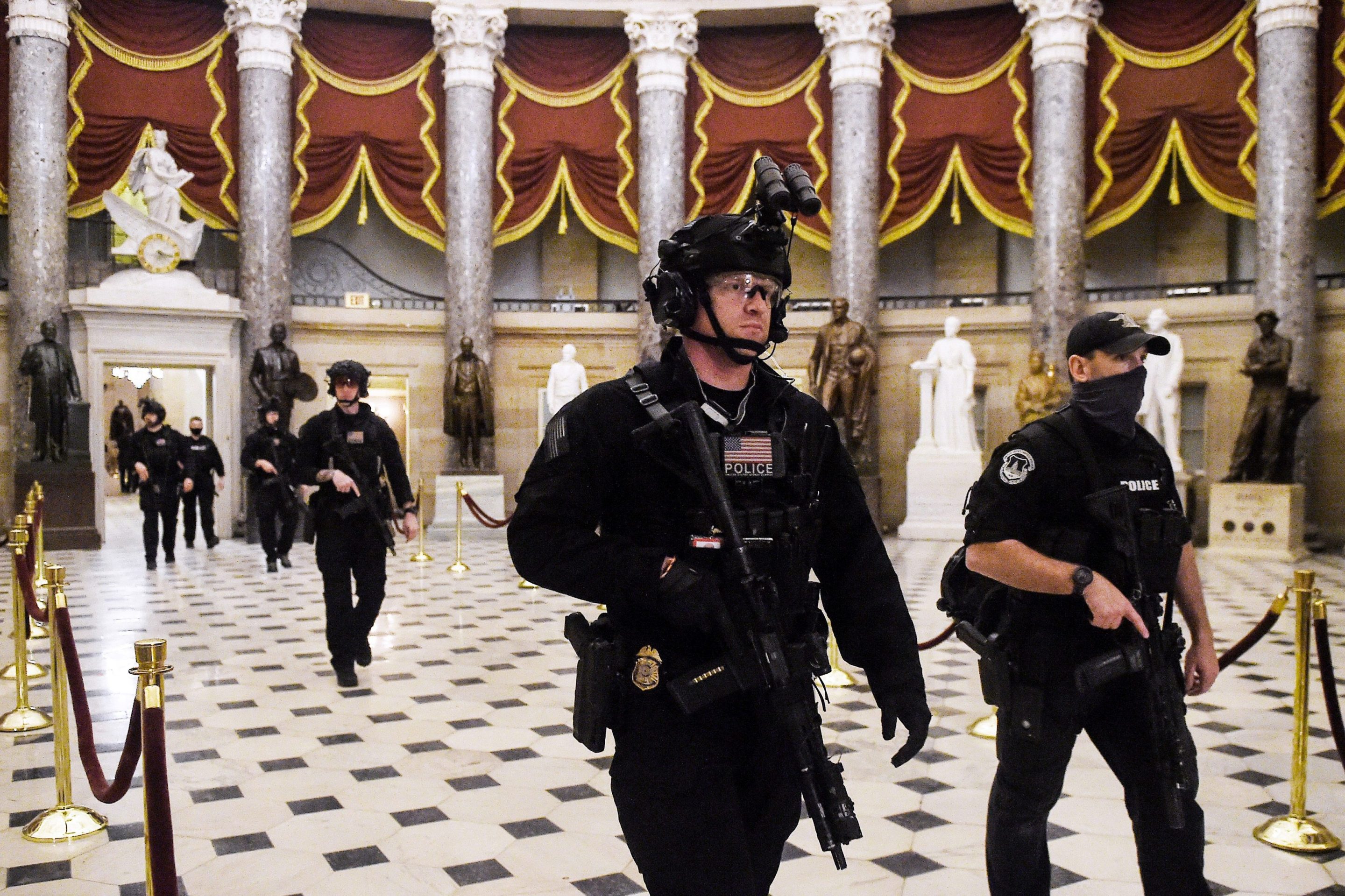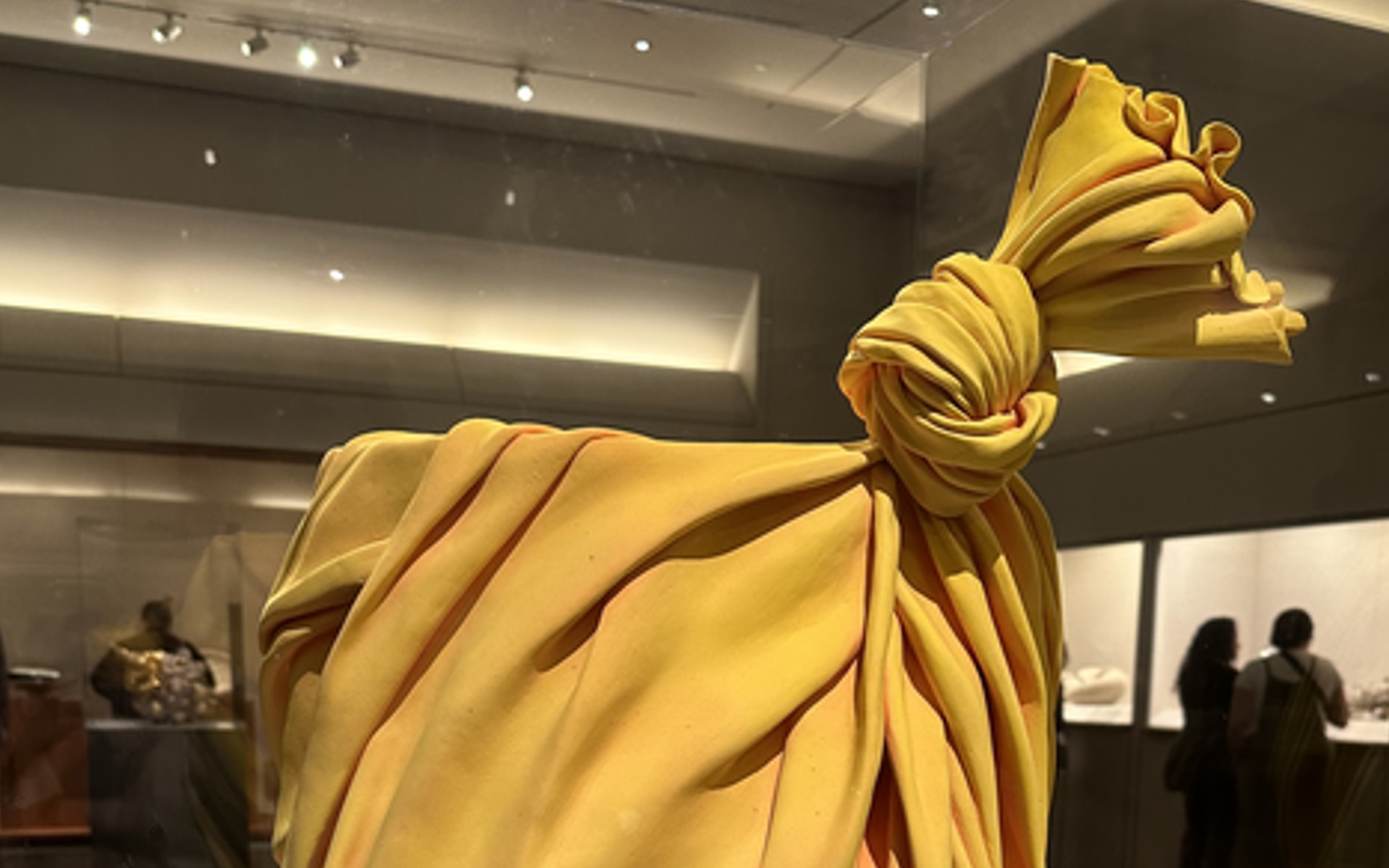I Don’t Know What The Answer Is, But It’s Definitely Not More Cops
10:14 AM EST on January 8, 2021

On Wednesday afternoon, a mixture of YouTubers, militia freaks, and old-school racists occupied the Capitol building in the hopes of either overturning the presidential election or getting a few retweets. In the midst of this chaos, an Air Force veteran named Ashli Babbitt attempted to jump through a broken window and into a hallway held by U.S. Capitol Police forces—one that possibly contained important members of the government. Video of her actions—which I must stress is very graphic—shows that as she tried to pass through to the other side of a barricade, a single shot fired by what was later confirmed to be a Capitol police officer hit her somewhere around the chest. Babbitt died later that day. Law enforcement told NPR that she had been unarmed.
In the hours since her death, there’s been plenty of interest in Babbitt’s public social media postings. The narrative her Twitter feed presents is almost too perfect, too rote—a California Trump supporter is drawn deeper and deeper into an incomprehensible web of bullshit conspiracies until eventually she finds herself on the wrong side of a confrontation with police in D.C. Zoom out, and it is possible to see her as a sympathetic figure, the most extreme version of the many tragic victims whose minds have been destroyed by the unending lies of the Republican Party. But on a personal level, based on the tenor of her posts and videos, it’s difficult to see her as anything other than an exhaustingly shitty person.
Babbitt’s instantly recognizable brand of in-your-face hatred coupled with the plainly idiotic choices she made in the minutes and hours before her death presents an odd situation. After a year defined by mournful vigils and massive protests in honor of black people like George Floyd, Breonna Taylor, and Tony McDade, who were killed by police officers and the racist system that enables them, here is a much different type of person whose killing was caught on film. This time, in what I would call the center-left spot of Twitter, a police shooting served as an opportunity for celebration, as a chance to happily appreciate this instance of a distinctly bad unarmed person being shot by an armed agent of the state who, at least for that instant, was on their side. This particularly popular tweet from Charlotte Clymer—a prominent activist who since leaving the army has made her living with left-leaning advocacy groups—expresses the unsettling sentiment that justice was served when Babbitt was shot down without a trial or jury. The bloodthirsty replies below it and in response to those trying to express empathy are legitimately frightening to anyone who wants to see less and not more police violence in this country.
Please stop saying that woman's death is a tragedy. She was a traitor and a terrorist. She was prior military and sure as hell knew the risks of breaking into the U.S. Capitol. Stop excusing the heinous actions of white women. It's absurd.
— Charlotte Clymer 🏳️🌈 (@cmclymer) January 7, 2021
That Clymer, a trans woman whose history with the Human Rights Campaign should in theory give her some familiarity with the struggles of marginalized trans people, would firmly co-sign such a shocking act of violence by the state against a citizen feels especially awful, at least to me, a person who’s aware of what our broken criminal justice system did to people like McDade and Layleen Polanco. But it’s of a piece with a certain kind of liberal response that gets endorsed in huge numbers when white nationalist violence—or simply violence committed by white people—is in the news. Most recently, when a man detonated a bomb in downtown Nashville on Christmas, there was a widespread, entirely pointless call to make sure the disturbed conspiracy theorist got called a “terrorist,” as if applying that language to a white person would somehow make up for the years and years of torture, racial profiling, and drone strikes that it has justified against Muslims around the world.
I took the liberty of editing the New York Times headline: pic.twitter.com/X7iJ4jtYuJ
— Ayman Mohyeldin (@AymanM) December 28, 2020
This kind of reaction makes sense, to a certain degree. Marginalized people who are refused empathy when they face their own tragedies will in turn feel an all-too-human motivation to deny empathy to those groups who oppress them. If George Floyd can be instantly sentenced to death by some dipshit with a badge because he got caught with a counterfeit bill, who cares that Ashli Babbitt can lose her life while participating in a moronic attempt at a coup? If the War On Terror allowed the CIA and the Department of Defense to mercilessly inflict horrific pain on Muslims that they decided were “terrorists,” what’s wrong with insisting that label be used for Michigan rednecks who plotted to kidnap the governor?
I have moral and ethical objections to this way of thinking, supported by cliches like Matthew 5:44 and “two wrongs don’t make a right.” But more importantly, I also have a strategic objection—one that doesn’t require you to feel sorry in the least for the country’s worst people if you don’t want to. It stems from a conviction, backed up by empirical evidence, that, until some sort of enormous political and societal change occurs, those who are empowered to use violence in America will always, always treat the privileged—white people, cis people, rich people—better than they treat everybody else. Calling for the unaccountable institution that is law enforcement to start getting tough on every deranged hick “terrorist” who googles “how to make car bomb,” and cheering cops on for using lethal force against an unarmed woman like Babbitt only gives the state implicit permission to stand a little harder on everyone’s necks. It makes it easier for them to trample over the rights of New Yorkers holding a vigil outside of Barclays Center, or brutalize anyone seeking social justice in any of the thousand ways cops did in the summer of 2020. Giving the cops a bigger boot won’t make them any more careful about who they step on.
Short of a time machine, I don’t have any clear solutions for how to deal with something like what happened on Wednesday—as Samer wrote yesterday, this country just doesn’t have the proper framework or willpower necessary for administering consequences to the powerful people who are responsible for this. But I do have a fear. The Black Lives Matter protests of 2020 have seriously motivated large numbers of right-wing politicians to try and crack down on the right to protest in America. In Florida, for example, Gov. Ron DeSantis has championed bills that would let vigilantes murder people engaged in “criminal mischief” that disrupts businesses, and allow drivers to run over protestors who block the road.
The anti-democratic (small D) nature of those ideas should be obvious. But this is what I worry about: The storming of the Capitol on Wednesday, and the many passionate arguments condemning officers who passively allowed it to happen, and the cheers for one who actually did fire their gun, now gives moderates and centrists a motivation to pursue those same anti-protest, “law and order” goals, but from a different path. (Instead of opting for a more constructive response like, say, D.C. statehood.) This tweet from Hawaii Sen. Brian Schatz, later deleted and rephrased, is the exact kind of emotional, unthinking call for more guns and more state power that I’d like to avoid, lest almost all of the American political spectrum become consumed with giving further authority to the people who become part of the Capitol mob once they clock out—the people whom, if this summer taught us anything, we should trust the least.

This isn’t an attempt at both-sidesism, or me trying to say that all kinds of protests are created equal and should be allowed in equal measure. I think some property damage is meaningless when compared to extrajudicial executions of black people and I also believe that a few hundred weirdos shouldn’t try and overrule an election. But the law isn’t designed to see things with that kind of nuance.
Legislation filed in Florida on Wednesday night plainly shows how impossible it would be to write any kind of progressive beliefs into laws that increase the power of the criminal justice system. The bill, ostensibly a response to what happened at the Capitol, makes it more difficult for local governments to reduce police budgets, bumps up penalties for things like assault and battery when they happen “in furtherance of a riot” and makes it a felony to pull down “any memorial,” i.e. a Confederate monument. It’s a bill plainly written to increase jail populations—an inevitable result of any attempt, from the left or right, to “crack down” on protestors.
“In light of today’s events at our United States Capitol, we have no time to waste to uphold public safety,” Gov. DeSantis said in a statement. “I look forward to working with House Speaker Sprowls and Senate President Simpson to swiftly pass this bill during the upcoming Legislative Session so that we may protect the rule of law in our great state.”
Given that DeSantis is buddies with Trump and laid bare his clearcut fascist agenda just last year, I could not buy his sincerity any less. The same goes for scores of Republican politicians who fit the same description. Any legislative response to the riot at the Capitol that gains the approval of someone who pals around with the President or condemned BLM or “antifa” last year should be met with intense suspicion, if not immediately rejected out of hand. And no matter how well-meaning liberals might be, and no matter how depressed they might feel by the cops who opened the barricades, or how inspired they might be by the one cop who they think did his job right, there’s simply no way to increase police power in a way that only targets the bad guys. If Joe Biden is going to talk about passing laws against “domestic terrorism,” he must be aware that, in the eyes of many police officers, that word applies to the Black Lives Matter movement. They are the leopards that eat people’s faces, and the fact that one person with an eaten face was a piece of shit is not a good excuse to hire more leopards, or to sharpen their teeth.
I’m not telling you to feel sympathy for Ashli Babbitt. But in the interest of our own self preservation, it’s crucial that this moment not be used to create some sort of Domestic War On Terror, because we know how many innocent people will be harmed as a result. If you’re going to give someone power, first ask yourself, “What is the absolute worst thing that they could do with this?” And then make sure you’re prepared for that outcome.
If you liked this blog, please share it! Your referrals help Defector reach new readers, and those new readers always get a few free blogs before encountering our paywall.
Editor
Read More:
Stay in touch
Sign up for our free newsletter




